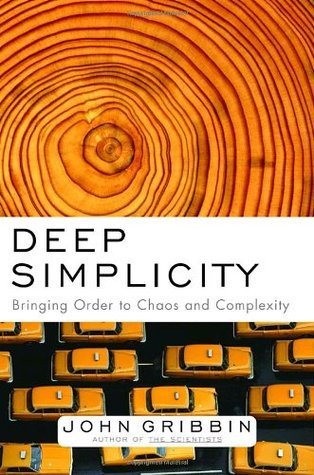I have read a few John Gribbin books and loved them all. His book about quantum theory, 'In Search of Schrödinger's Cat', is a classic. I have had 'Deep Simplicity' with me for a long time. I thought it was time to take it out and read it for 'Science September'.
In 'Deep Simplicity', John Gribbin talks about Chaos theory. I remember during my student days one of my classmates was reading about it and he was planning to apply it in his research on business cycles. I don't know whether he was able to do that and whether he came out with interesting predictions which came true. That was probably the first time that I had heard about Chaos theory. In essence, as John Gribbin describes it, Chaos theory is simple. It tries to study systems which start with simple origins but result in complex patterns and behaviour. And it also tries to study what happens if some minor changes are made at the start. The conclusion is that minor changes in the initial conditions will lead to complex, unbelievable changes later. That is all there is to Chaos theory. Because it is an interdisciplinary field with applications across different areas like physics, chemistry, biology, geology, economics, the stock market, traffic movement and weather forecasting, there are many different techniques and ways of studying how real world systems behave, when they evolve from simple origins to complex futures. John Gribbin describes some of these across these different fascinating fields. He describes the beauty of fractals and how they are observed in the real world in surprising ways. He talks about something called the 'power law' and describes how it amazes us by manifesting itself in the real world in surprising ways. Gribbin is strong when he talks about physics and its related areas because it is his field, but he also spends considerable time in biology, the evolution of life and the extinction of dinosaurs and other species. It is very fascinating to read.
I enjoyed reading 'Deep Simplicity'. John Gribbin gives a beautiful guided tour of physics in the initial chapters before delving into other branches of science and other fields, while exploring Chaos theory. It is not an easy read, because it demands close attention and contemplation, but it is a rewarding read.
I am giving below the first couple of passages from the introduction to the book which sets the tone for the rest of the book, so that you can get a flavour for the subject and also experience Gribbin's style.
"The world around us seems to be a complex place. Although there are some simple truths that seem to be eternal (apples always fall to the ground, not to the sky; the Sun rises in the east, never in the west), our lives, in spite of modern technology, are still, all too often, at the mercy of complicated processes that produce dramatic changes out of the blue. Weather forecasting is still as much an art as a science; earthquakes and volcanic eruptions strike unpredictably, and seemingly at random; stock-market fluctuations continue to produce boom and bust with no obvious pattern to them. From the time of Galileo (in round numbers, the beginning of the seventeenth century) science made progress – enormous progress – largely by ignoring these complexities, and focusing on the simple questions, looking to explain why apples fall to the ground, and why the Sun rises in the east. Progress was so spectacular, indeed, that by about the middle of the twentieth century all the simple questions had been answered. Concepts such as the general theory of relativity and quantum mechanics explained the overall workings of the Universe on the very large and very small scales respectively, while the discovery of the structure of DNA and the way in which it is copied from generation to generation made life itself, and evolution, seem simple at the molecular level. And yet, the complexity of the world at the human level – at the level of life – remained. The most interesting question of all, the question of how life could have emerged from non-life, remained unanswered.
It is no surprise that the most complex features of the Universe, which proved most reluctant to yield to the traditional methods of scientific investigation, should exist on our scale. Indeed, we may be the most complex things there are in the Universe. The reason is that on smaller scales entities such as individual atoms behave in a relatively simple way in their one-to-one interactions, and that complicated and interesting things are produced when many atoms are linked together in complicated and interesting ways, to make things like people. But this process cannot continue indefinitely, since if more and more atoms are joined together, their total mass increases to the point where gravity crushes all the interesting structure out of existence. An atom, or even a simple molecule like water, is simpler than a human being because it has little internal structure; a star, or the interior of a planet, is simpler than a human being because gravity crushes any structure out of existence. And that is why science can tell us more about the behaviour of atoms and the internal workings of the stars than it can about the way people behave."
Have you read 'Deep Simplicity' by John Gribbin? What do you think about it?







